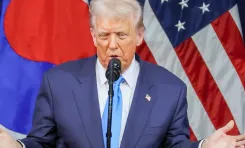Why Does ‘Tailored’ Intelligence Serve No Purpose?

Synopsis
Key Takeaways
- Intelligence is essential for national security.
- Accurate information aids policy formulation.
- Tailored intelligence can lead to biased decision-making.
- Intelligence agencies must remain independent.
- Failure to act on intelligence can lead to security threats.
New Delhi, Aug 3 (NationPress) Intelligence, by its very nature, is trustworthy information that reveals ‘what lies ahead’, highlighting the risks confronting a nation or an organizational entity while simultaneously pointing out potential opportunities that can be seized. This information is crucial for policy formulation and informed decision-making.
While intelligence does not dictate policy, it is essential for the governing body to respect it for their own benefit. The cornerstone of intelligence is that the reliability of the information must never be questioned.
Interestingly, the declassified files related to the 2016 Presidential election labeled the intelligence regarding Russian President Vladimir Putin’s support for Donald Trump as substandard; there was no classification that required such intelligence to be either deemed reliable or discarded.
In India, national intelligence agencies traditionally sought independent verification of information before presenting it as intelligence. If the information was of such significance that it couldn't be withheld, it would be shared, provided the agencies were fully convinced of its accuracy. Typically, such information was shared with the label ‘reliable but unconfirmed’. A failure to communicate intelligence to the appropriate authorities, even when available, is considered an inexcusable oversight as it could lead to a complete breakdown of national security. The only other reason for such failures could be the lack of response to available intelligence from those responsible for action.
Intelligence is fundamentally ‘information for action’, and in this context, intelligence agencies and the government machinery responsible for execution share equal accountability for any failures.
There can be no compromise on the principles governing the collection and dissemination of intelligence to those in power. Intelligence encompasses information about potential threats to the nation’s security, unity, and sovereignty, as judged by the intelligence provider, and it must be communicated to the nation's leaders without delay.
In a democracy characterized by electoral politics, government leaders are sensitive to information that may lead to criticism regarding their response to potential threats. They often prefer information that enhances their image. The worst scenario for intelligence management arises when it is in the hands of individuals who prioritize reporting what the rulers want to hear. This degradation is more apparent in autocratic regimes.
Intelligence organizations serve as a tool for the ruling elite to understand the internal dynamics of the country and identify its friends and adversaries on the global stage. Why would the leadership resist receiving reports in confidence? They would likely welcome the opportunity to use intelligence for necessary policy corrections.
It is noted that President Putin's steadfast belief that Ukraine would quickly succumb, seemingly based on security evaluations, culminated in a significant intelligence failure. The extent to which these assessments were influenced by Putin's strong desire is open to speculation. Regarding the U.S., President Trump’s authoritarian approach to intelligence, stemming from his populist and personalized style, led him to dismiss Director of National Intelligence Tulsi Gabbard’s congressional testimony, which indicated that Iran was not close to developing a nuclear weapon.
Trump was unwilling to grant any leeway to Iran on its assertion that its program was solely for nuclear energy. As the U.S. President, he was entitled to incorporate this into U.S. policy concerning the Middle East. Following his decision to deploy bombers against Iran's nuclear facilities and allow bunker buster bombs to be dropped on the nuclear site at Fordow, buried deep under a mountain near Tehran, he claimed the sites were ‘totally destroyed’, despite his own Defense Intelligence Agency (DIA) indicating that the sites were severely damaged but not obliterated.
It may be difficult to fault Trump for exaggerating his claims because extensive bombing of Iran's nuclear facilities has been a cornerstone of U.S. policy toward that nation. This may explain why Gabbard and CIA chief John Ratcliffe supported Trump’s stance after a further examination of the events.
Intelligence is not simply a one-off report regarding a threat; it is now integral to national governance. It aids in policy formulation and also monitors the impact and implementation of policies, driven by the belief that intelligence always works to safeguard national interests.
Working closely with the ruling elite and accepting legitimate directives from the government should not lead to the intelligence apparatus succumbing to undue political influence or becoming complacent about its duties. Additionally, experience, merit, and seniority should be prioritized in assigning senior roles within the intelligence structure.
In India, there have been only two instances post-independence of lateral entry to the Chief of Intelligence position; one was purely based on merit and was highly successful, while the other was marred by political favoritism, resulting in mediocre performance.
Intelligence is distinct from other governmental functions; it demands a specific level of training, acceptance of anonymity as a core work ethic, and a commitment to hard work without a ‘fear of failure’.
Fortunately for India, our national intelligence agencies have developed commendably to competently fulfill their comprehensive role of safeguarding national security and sovereignty.
It is imperative to uphold the fundamentals of intelligence work concerning personal discipline, public responsibility, and a national perspective. The intelligence organization determines what constitutes an impending threat to the nation and does not wait for political clearance to commence action.
Intelligence officers possess a keen understanding that ‘all intelligence is information, but not all information constitutes intelligence’. The classification of intelligence into Internal, External, and Technical realms has rendered coordination among agencies crucial; all intelligence must converge at a national apex to enable a holistic assessment of the overall situation and ensure no information is lost in transit. The roles of the Director of National Intelligence (DNI) and National Security Advisor (NSA) have gained particular significance for this reason.
An intelligence assessment must be clear, devoid of subjective opinion or personal bias, and wholly aligned with the principles of national unity and sovereignty. It should be open to adjustments in light of new intelligence, as the security landscape is never static. Finally, there is a critical question regarding the responsibility of the Agency chief to maintain the legacy of intelligence management, ensuring that the established principles of the intelligence function remain uninterrupted.
(The writer is a former Director of the Intelligence Bureau)








